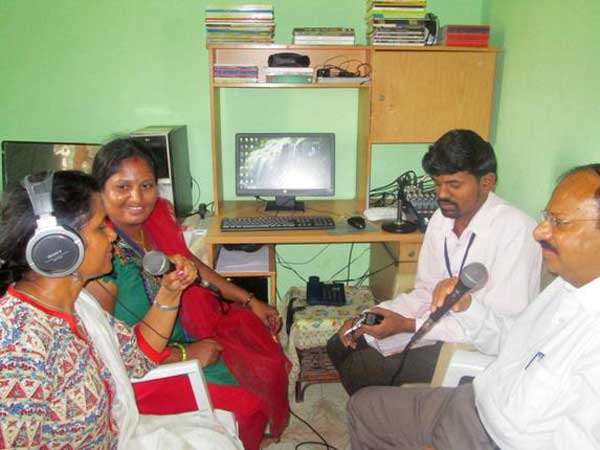People Sarathi Jhalak, a community radio station in rural Bangalore, is seeing a steady increase in its listener base. Shamantha D.S., who started the station, walks RESHMA KRISHNAMURTHY SHARMA through the success story
It’s hard not to get affected by Shamantha D.S’s exuberance. Sarathi Jhalak, a community radio station in rural Bangalore at Anugondanahalli, in Hoskote taluk has seen a steady increase in its listener’s base since last August, thanks to Shamantha’s efforts.
Unlike the skyscraper views of most radio stations in Bangalore or the hi-tech ambience, Sarathi Jhalak which is aired on 90.4 FM has a view of tomato fields and cabbage gardens and a bare look room with basic equipment.
Simplicity seems to be the main reason for the station’s rising popularity. The listeners from the villages nearby want content that talks their language and highlight issues that affect them. Doing the balancing act between being a regular station and a community radio station has been a challenge for Sarathi Jhalak.
What was started as an all-woman station is now also employing men as RJs, for program supervision and content programming.
Ranging from programs that target the student community and women,, the RJ’s of 90.4 FM say their chosen part-time career has been an eye-opener for everyone.
“On an average we are on air for about 16 hours a day from Monday to Saturday with Kannada anchoring and songs of folk to classical music and film songs from Kannada, Telugu and Hindi films to cater to this region’s audience tastes,” says Shamantha.
The dynamic young woman has been into radio journalism as well as other streams of media careers says starting the radio station through her NGO, Sarathi has been the high point of her career. Shamantha is excited and believes the community radio station has the potential to make a difference in the lives of people in Anugondanahalli and nearby areas.
The RJs of Sarathi Jhalak come from very varied backgrounds. They all hail from Anugondanahalli and continue with their day jobs of beautician, driver and counsellor at a hospital. They allocate a few hours to radio out of passion, admitting they had not expected such a response that has turned them into mini celebrities!
Shamantha admits it has not been easy. “I am thankful to government agencies such as BSNL, BESCOM and BECIL who supported us with technical know-how for a radio station including telephone lines and assisted us with relevant technical knowledge to run the station smoothly. Of course we were all very anxious for the first month as we didn’t know whether we had plunged into the right thing. Today we are happy we are part of a radio station that many villages have made their companion.” She adds that her radio experience at AIR and guidance by key people from AIR has helped her set up the station.
When asked about taking a backseat after being in the forefront as a RJ, and filmmaker, Shamantha demands, “Isn’t seeing a team running a station a greater responsibility? I do go on air sometimes but I feel happy when I see my RJs who were novices and have now turned out to be polished professionals. The listeners’ response in the form of text messages (250 in two hours) and hordes of letters is proof of the adulation we receive.”
After a pause she adds, “Once a boy was lost and we were able to reunite him with his parents within a few hours thanks to the alertness of another listener and our phone lines being open. It is incidents like this or our program Manasina Mathu where youngsters talk of their worries and concerns on air and that make us realize that it’s not only urbanites who are stressed out.”
Shamantha reserves her visits to the station to once or twice a week and has handed the day-to-day management to the RJs and program director. Shamantha who is continuing to dabble in filmmaking and developmental journalism sums up saying, “Sarathi Jhalak has offered insights on the needs of villagers. For instance the need for old age homes in villages, as most youngsters are in cities on work. Issues like this can be addressed and their needs can be taken care of by organisations. We have a long way to go to extendour reach. We are now able to reach only nearby villages and we are hoping our radio reaches more listeners. Finally, along with regular entertainment programs, if we are able to address the needs of the rural folk, that would be Sarathi’s biggest achievement.”

